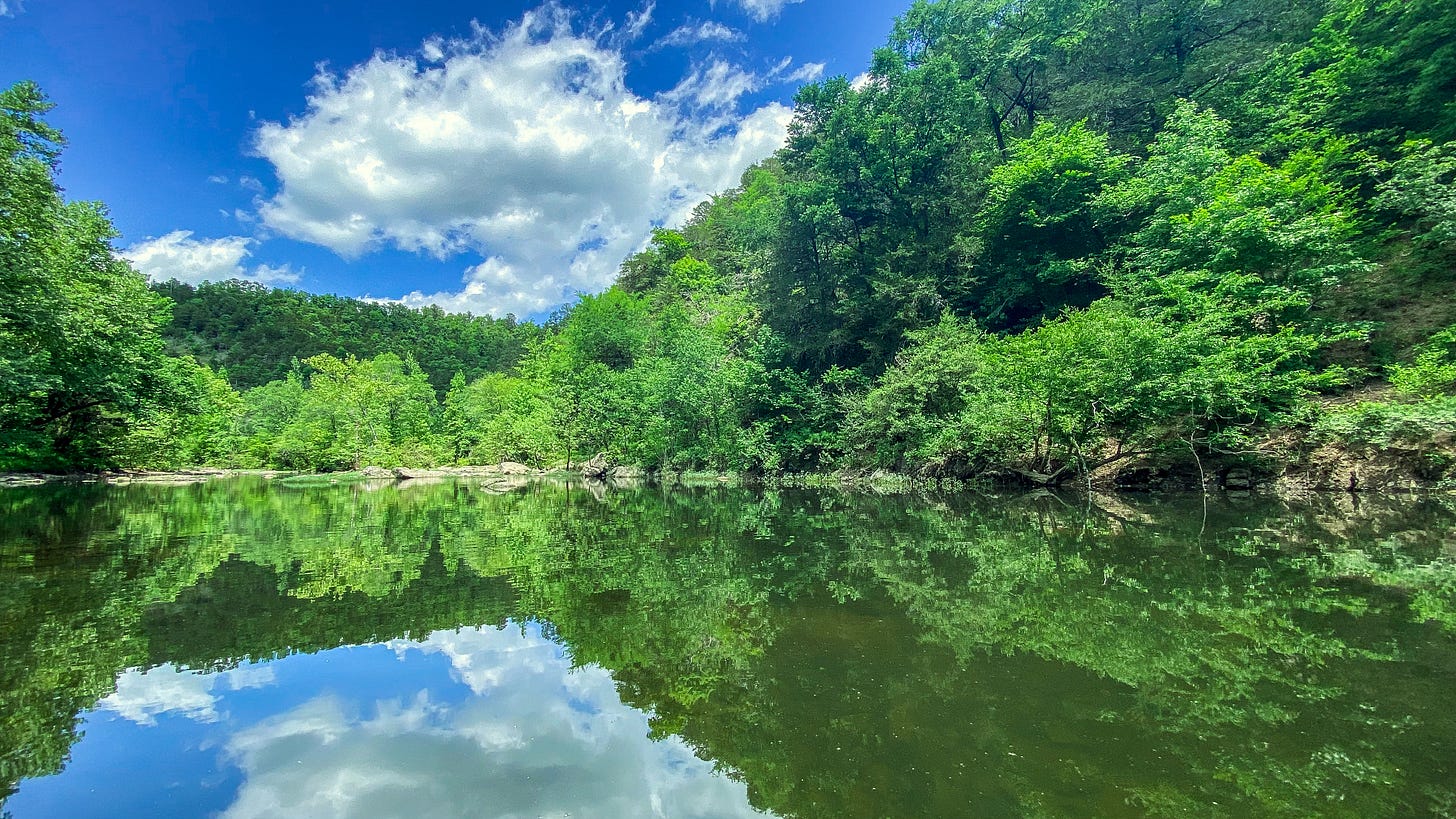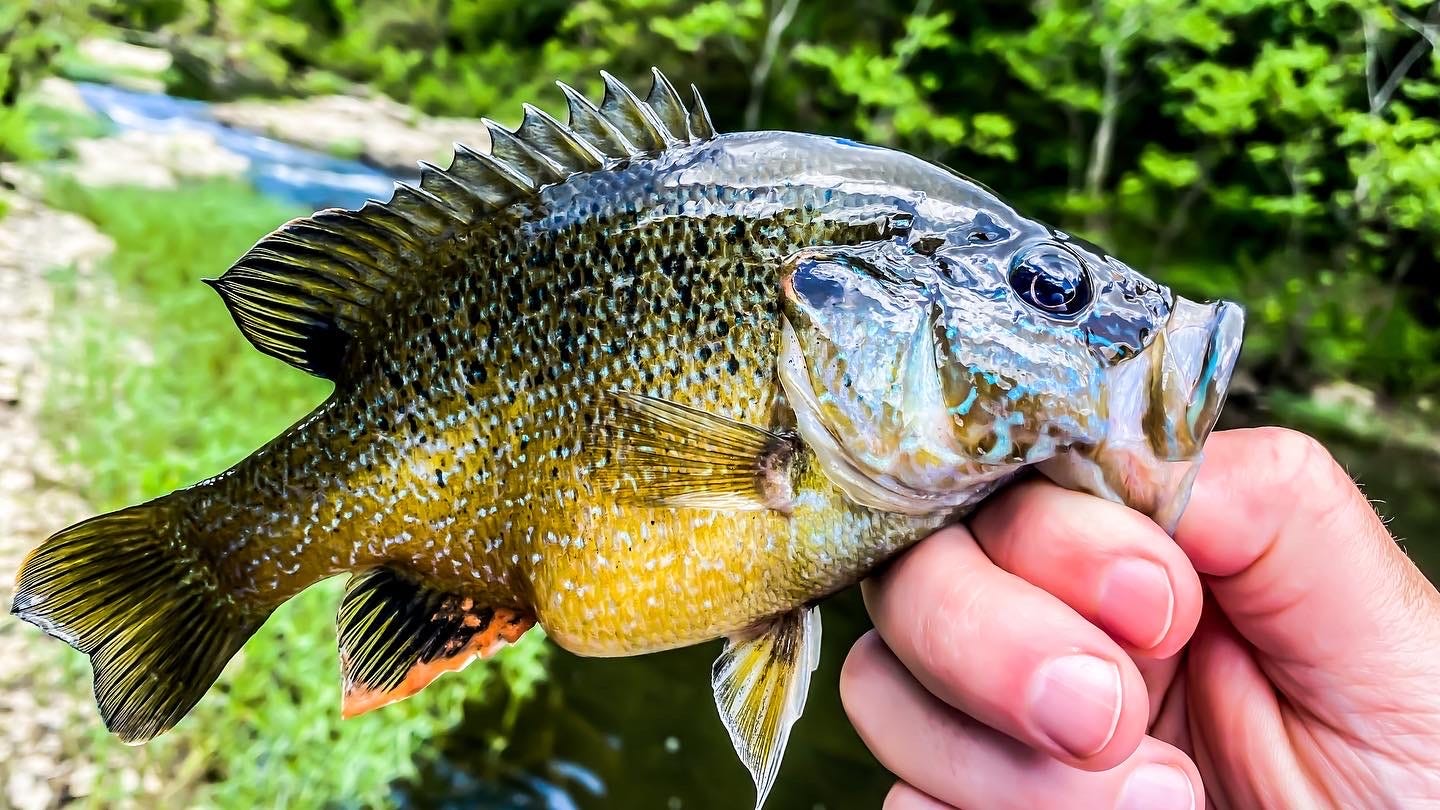Yesterday was a clear and sunny 85, and the Subaru glided over the dusty, washboard gravel. I parked in the shade of sycamore trees and could hear the small stream gurgling under the low-water bridge. The water level was just right for wade fishing.
Sometimes I bring my fly rod on excursions like this, but not if I actually want to catch fish. Instead, I bought a light spinning rod and a soft plastic hellgrammite lure. Smallmouth bass love these critters, which are designed to mimic the larval stage of the Dobson fly. I began to work my way down the clear, cool stream, which was flowing through a narrow channel on its way to a deeper pool about 30 yards downstream.
I am hyper-vigilant when I’m out like this. The beauty is stunning, but it can also be a dangerous distraction. I realize that I’m the outsider, on the home field of copperheads and water moccasins. And while bites are rare and deaths are almost unheard of, the chances of an encounter are not zero. There’s also the water. This particular stream runs through a narrow-walled valley with cliffs rising more than 100 feet above. A brief, intense shower far upstream can cause water levels to rise quickly. I’ve seen it rise as much as two feet in a matter of minutes. To be in alone nature is to be acquainted with one’s own fragility.
I made it to the deeper pool of water and began casting. I wanted my lure to reach a downed log that jutted out from an overhanging bank on the far side, but I was about 10 feet short. I needed to wade in deeper. As the cool water began to reach my core, I stopped. The water was neither dangerously cold nor swift, but I was paralyzed. I gave up, turned back toward the bank, and made my way downstream.
About 20 yards down, I found a shallow shoal that afforded me access to the middle of the stream. I crossed in knee-deep water, and cast the hellgrammite right on my target. I managed to pull a few fish out of that spot, but not the smallmouth I was dreaming of. And that’s when the lights went out.
A huge, pillowy cumulus cloud had drifted overhead, obscuring the sun. And while the shade was a momentary relief, it was also a problem. In case you’re not familiar with wade fishing, rocks matter: bigger is slicker. Dedicated wading boots often have felt bottoms that grip to slick surfaces even when wet. I was wearing a weathered pair of Chacos that - while worth every penny - are not made for wading over slippery rocks.
As a general rule, any rock bigger than your foot is too slippery to count on. I had navigated my way to midstream on a gravely shoal. Under the bright sun, visibility was at least four feet in the translucent water. But when the cloud stole the sunlight, the stream’s surface instantly went opaque, the color of slate. Without that clarity, I had no idea what my next step would bring: safe stepping on river gravel, a head-deep hole, or a trash-can-sized rock that would baptize me in mountain water. So I froze.
I’ve loved water all my life. In my analog youth, I captured thousands of crawdads in clear streams. I loved the smell of outboard fuel exhaust mixed with lake water as a 1980’s ski boat pulled me through a glassy cove on cypress skis. I consider myself fortunate to have fished on both coasts, and in the Gulf. One day I hope to live within sight of water and its many moods.
And yet I’m haunted by water. Two summers ago, I took my daughters kayaking on the White River. I wrote a separate post about it here. Only moments into that float, my younger daughter hit a dock and was immediately swept under by the current. The water held her against the structure. Her boat was at her back, bruising and pinning her underneath. She stayed calm by counting her respirations (something she learned as a lifelong asthma patient). When her arms would tire, she would sink into the water to rest. When her oxygen ran out, she would pull herself up and steal deep breaths.
I bailed out of my own boat and tried to swim to her, but her sister and I were carried downstream, helpless. That day was clear and hot. By nature, trout streams are cold. If big trout thrive there, you do not want to swim there. The water was clear, fast, and cold. It ripped my breath away. An off-duty fireman was at the same dock, readying his own boat. He heard my screams and saved my daughter’s life.
Since then, I am wary of water… especially cold water. Those of the “All’s well that ends well” camp don’t understand. And maybe I don’t fully understand it myself. But since that awful day on the White River, I’ve only been swimming maybe three times. I let the shower steam up the bathroom mirror before entering, to avoid stepping into cold water. So while knee deep water feels refreshing on a hot day, the thought of falling headfirst into it is still fairly terrifying.
When the cloud momentarily robbed the sunlight yesterday, I lost my view beneath the surface, along with all sense of security. I was in no real danger. I was just shaken. It is very difficult for the brain to quietly override what the body is screaming.
“We have learned that trauma is not just an event that took place sometime in the past; it is also the imprint left by that experience on mind, brain, and body. This imprint has ongoing consequences for how the human organism manages to survive in the present. Trauma results in a fundamental reorganization of the way mind and brain manage perceptions. It changes not only how we think and what we think about, but also our very capacity to think.” -Bessel A. van der Kolk, The Body Keeps the Score: Brain, Mind, and Body in the Healing of Trauma
Our home lies in the flight path of our community’s medical helicopter. I never hear those whirring blades without a sinking in my gut, thinking of the times I’ve loaded my daughter inside a med flight. I think of my pretending to be strong, of handing her a stuffed animal, and hearing the pilot say, “We’ll take good care of her, dad.” The body feels these things.
I spent unending weeks in various hospitals and clinics four years ago as my wife succumbed to metastatic melanoma. U.S. Pizza Company is a Little Rock institution, and it held the food concession for the hospital where we spent her final weeks. If I never smell have to smell U.S. Pizza again in my life, I’ll be glad.
At the end of 2021, I stepped away from two decades of ministry. A large part of that decision was my near inability to tolerate the sights, sounds, and smells - the beeping and blood - of hospitals in the regular course of my calling.
Going fishing might not look not like an act of defiance against trauma, but it is for me. Maybe someday I’ll rediscover the simple summer joy of cannonballing into cool water. But until then, I’ll occasionally punch trauma in the face by wading into waters. And I’ll be gentle with myself, too, doing the work of therapy and reading from experts like van der Kolk.
When clouds block the sun and obscure its beneficent light, the surface of your life may go ashen and dead. Your chest will pound. Maybe you’ll curse or cry, or feel that familiar paralysis. Something deep within your evolutionary self will gear your flesh to fight or fly. When that crucible comes, I hope that the clouds roll away first. Until then, hold tight and be gentle with you.
One day we will all stand in the sun, our vision perfected, with no more sterile sticks, no monitor beeps, whirring blades, or U.S. Pizza.




So good.😄
Awesome brother, sure enjoyed this !! I lost my wife , I feel your pain , I too escape to the great outdoors fir comfort..❤️👍🇺🇸🦅